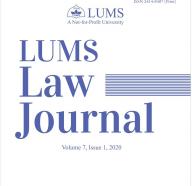
Since its initiation, the LUMS Law Journal has strived to provide a platform for legal scholarship in Pakistan on a variety of pertinent legal issues. This year, we are delighted to present the seventh volume of the LUMS Law Journal, which is a product of collaboration between practicing lawyers, students, and scholars.
This volume covers a wide variety of subjects that are relevant today in the Pakistani and international context. Muhammad Yar Lak makes an incredibly pertinent contribution by exploring the impact of the COVID-19 pandemic on contractual rights and obligations in light of the concept of force majeure. Shayan Manzar, in his article, sheds light on the varying statutory interpretation techniques employed by the United States’ Supreme Court in the jurisprudential development of the Fourteenth Amendment due process clause to make assertions relevant to the determinants of judicial behaviour. Dr. Shahbaz Ahmad Cheema analyses the legal and political implications of non-repugnancy decisions issued by the Federal Shariat Court of Pakistan. Aleena Khan provides a feminist perspective on the legal recognition and development of honour killings as a penal concept. Dr. Mudasra Sabreen explores the legal regime surrounding the issue of maintenance of children and stresses upon the need for comprehensive legislation. Aimen Akhtar emphasises the need for positive legislation to facilitate surrogacy in Pakistan. Beata Polok expounds upon Islamic Personal Law in Europe to highlight Personal Law issues faced by Muslims in Europe. Sara Raza unpacks the issue of the right to food sovereignty through the lens of human rights discussing how small and landless farmers and peasants need to be guaranteed a right to develop and sustain their own agricultural systems. Zia Ullah Ranjah contributes a case note on Orient Power Company (Private) Limited v Sui Northern Gas Pipelines Limited to uncover the latest development regarding the enforcement of foreign arbitral awards in Pakistan. Semra Islam reviews the Transgender Persons Act 2018 to gauge its effectiveness in ensuring the right to equality of the Pakistani transgender community. Finally, Punsara Amarasinghe contributes an insightful review of Dr. Hassan Khalilieh’s book, ‘Islamic Law of the Sea: Freedom of Navigation and Passage Rights in Islamic Thoughts.’
This volume was made possible because of the contributions of our esteemed colleagues, to whom we are incredibly grateful. We extend our utmost gratitude to the Chief Editor, Dr. Muhammad Zubair Abbasi, and the Co-Editor, Professor Marva Khan, for their guidance. We are also grateful to the members of our Editorial Committee, especially, Maha Malik, Momal Malik, Muhammad Usman Mumtaz, and Semra Islam who performed diligently in review process. The LUMS Law Journal’s primary aim is to encourage lawyers and law students to remain academically engaged and strive for excellence in legal scholarship. For this reason, the Journal welcomes feedback and remains open for submissions. For this purpose, please write to us at submissions.llj@lums.edu.pk
The Student Editors

